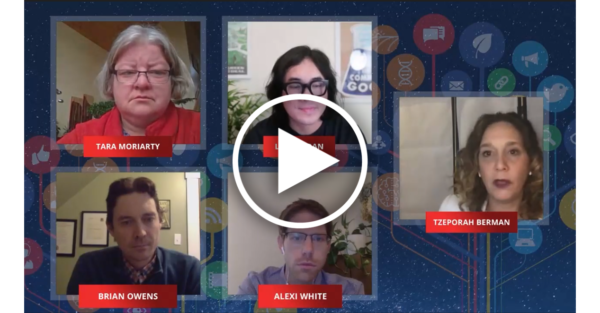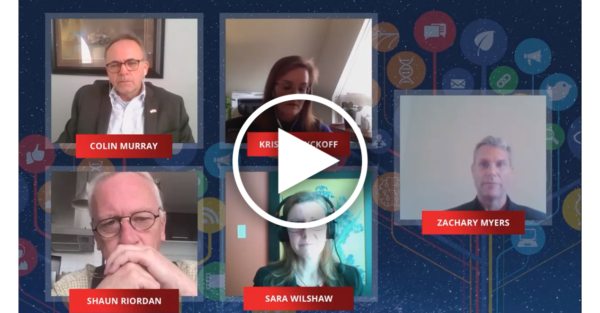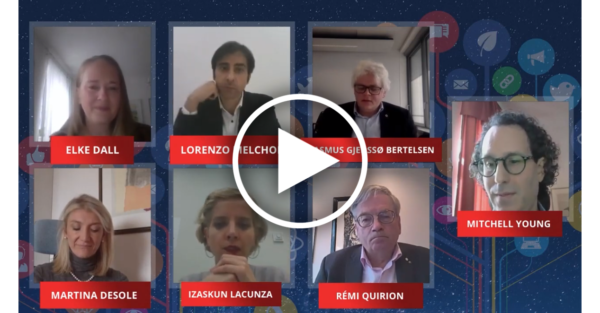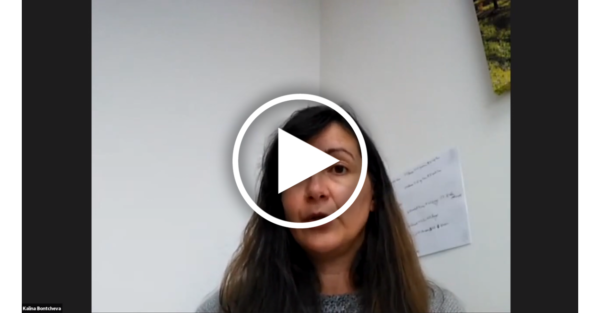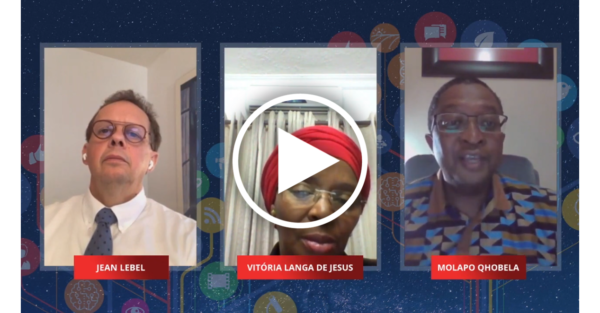The following are the CSPC 2020 panels that cover
Science and International Collaboration
Conference Day 3 – November 19th 2020
Organized by: Evidence for Democracy
Panelists:
Tzeporah Berman – International Program Director, Stand.Earth
Kimberly Girling – Interim Executive Director, Evidence for Democracy
Brian Owens – Freelance Journalist
Lucky Tran – Managing Director, March for Science
Tara Moriarty – Associate Professor, Infectious Diseases and Immunopathology, University of Toronto
Alexi White – Senior Advisor, Government Relations, University of British Columbia
Context: Grassroots movements can be powerful tools. As the world adapts to and recovers from COVID-19 grassroots advocacy can help empower communities and ensure our governments respond effectively to new challenges. However, effective advocacy isn’t easy. What are the factors that contribute to success? What drives communities to engage? What are the roles of various players?
This workshop discussed the key factors and lessons learned from successful grassroots engagement.
Takeaways:
- Advocacy is building power, collating information and presenting it to decision makers to engage both them and citizens to motivate and gain power to affect policy change.
- People may listen to scientists, but politicians and decision makers are not guided only by science and evidence.
- There is untapped potential in taking evidence from research and transforming that into policy but this requires addressing barriers such as gaps in communication (with both decision makers and the public), and a lack of time and resources.
- The news media will pay attention to advocacy in science when it accompanied by large public movements. Sustaining this media attention over a longer term is a challenge.
- In advocacy, values-based campaigns that people resonate with can be more powerful than scientific, explanation-based messages.
Actions:
- Engage media to share new knowledge, and mobilize social media to gather like-minded people. Tell a story that will resonate with the public (e.g., human interest story), and provide journalists with background information and reference materials on the subject.
- Use plain language and avoid “insider language”, and explain how the impact of an issue will affect each target audience.
- Use “power mapping” to identify who you need to influence and how can they be influenced.
- If a decision maker is not aware of the issue, start by trying to build trust and a relationship. If that fails, a protest backed by public support can be the tipping point for change.
- Is the goal a specific outcome or to push the conversation in certain directions? Consider the desired scope of change, and the willingness to compromise. There may be value in working with other stakeholders.
- When starting a conversation with decision makers, consider the issue from their perspective. What are their priorities, and what consequences do they face in addressing this issue?
Conference Day 3 – November 19th 2020
Organized by: Department of National Defence
Panelists:
Zachary Myers – Canadian Armed Forces Engineering Officer, Canadian Armed Forces
Kristin Wycoff – Senior Advisor (U.S.), Defense Research and Development Canada, US Department of Homeland Security Science & Technology
Shaun Riordan – Director of the Chair for Diplomacy and Cyberspace, European Institute of Cyberspace
Sara Wilshaw – Chief Trade Commissioner of Canada and Assistant Deputy Minister, International Business Development, Global Affairs Canada
Colin Murray – Defence R&D Canada Senior Advisor, U.S. Department of Homeland Security Science & Technology Directorate
Context: Within the current world, there are several global issues that require international collaboration if we hope to overcome them. Beyond the immediate crisis of COVID-19, several challenges remain such as climate change, ocean health, access to clean water, and cybersecurity. These challenges transcend national boundaries. As the world opens up afterward COVID-19, what will scientific collaboration look like as we adjust to this new post-pandemic normal? During this new period, the role of policymakers and diplomats will be particularly critical to facilitate the opening of the space for international scientific collaboration to resume.
Takeaways:
- The COVID-19 pandemic has accelerated the move towards digitizing meeting spaces and workflows, increasing the importance of cybersecurity as part of national security.
- The biggest threat to cybersecurity remains the human factor, by way of phishing attacks and psychological manipulation. Efforts to bolster cybersecurity should focus on education and training of personnel at least as much as on technical improvements.
- The shift to digital spaces has also exacerbated various societal issues such as cyber rights, gender rights, and the threat of misinformation.
- A primary role of science diplomats is to be ‘science brokers’ who identify science and innovation that address national issues, even if that science is in another country.
- In a post-pandemic era, which will see reduced international travel, embassies may play a bigger role as centres of diplomacy, including science diplomacy.
- As scientists get more involved in policy matters and speak in support of a policy, they are no longer only scientists but policy advocates, which may affect there standing as detached observers.
Actions:
- Institutions and organizations should be aware of cybersecurity threats and take steps to protect research, researchers and networks.
- Governments should reduce barriers to international collaboration by simplifying processes for sharing data, making use of compatible software, and engaging in science diplomacy.
- Developed nations should develop a degree of ‘humility’, acknowledge other countries may have addressed the COVID-19 Pandemic more effectively, and take steps to learn from their own mistakes and the success of others.
- International organizations such as the United Nations should play a role in developing digital platforms dedicated to diplomacy to replace social media platforms such as Facebook and Twitter.
- In their approaches to ‘building back better’, governments around the world should focus on developing more resilient economies and institutions, and focus on grand issues facing society, such as climate change and social injustice.
Conference Day 1 – November 16th 2020
Organized by: Centre for Social Innovation
Panelists:
Elke Dall – Project Coordinator, Centre for Social Innovation (ZSI)
Lorenzo Melchor – EU Science Advisor and Diplomacy Officer, Spanish Foundation for Science and Technology (FECYT)
Rasmus Gjedssø Bertelsen – Professor of Northern Studies, Barents Chair in Politics, UiT The Arctic University of Norway
Martina Desole – Head of International Cooperation and Innovation, Agency for the Promotion of European Research
Izaskun Lacunza – Science Policy Practitioner, Spanish Foundation for Science and Technology (FECYT)
Rémi Quirion – Chief Scientist of Quebec, Government of Quebec
Mitchell Young – Assistant Professor, Dept. of European Studies, Charles University, Prague
Context: Soft-power assets are becoming even more important in an increasingly polarized world. Yet, the role of science, technology, and knowledge in foreign policy discourse is still undervalued. In order to address global challenges, it is particularly important to bring the two spheres together. The current COVID-19 crisis opens an opportunity for further cooperation between EU and Canada, including better global governance mechanisms to tackle recurring outbreaks of this pandemic as well as other global challenges. Science diplomacy could foster this global joint response. The European Union has been promoting a global strategy with an increasing emphasis on science diplomacy and supported research projects—including S4D4C and InsSciDE—which form a “EU science diplomacy cluster” focusing on the interface between culture, science, technology, and international affairs. A more narrative review of the panel session can be found here.
Takeaways:
- Europe and Canada share many historical, economic and socio-political ties. The audience ranked climate change, pandemics and global health, and arctic and ocean science as the top three scientific challenges for science diplomacy to address based on our shared values. Such grand challenges cannot be solved by a single actor; they require collaboration, trusted relationships, and shared actions of many actors.
- Promoting international scientific collaborations, fostering collaboration between nations, and facilitating multilateralism and international cooperation frameworks are key when promoting science diplomacy as a strategic approach.
- When we think of science diplomacy, we tend to create an idea of communication between distinct groups of actors that have clearly demarcated professional identities and corresponding agendas (“scientists”, “diplomats”, “science managers”, etc.). However, the activities and agendas of actors do not always conform with an apparent professional identity. This blending of agendas, activities and identities contributes both to the huge potential and to the complexity of science diplomacy.
- Scientific advice informs international diplomacy which improves science cooperation. Strengthening awareness of science diplomacy will help to address global challenges.
Actions:
- Increase knowledge: Fund research to address global challenges. Exploit liaison offices across the world for science and research.
- Good governance: Establish fundamental frameworks, funding programs, cooperation agreements and conditions conducive to reduce, breakdown and reach across silos. Open up government offices and embassies to scientists.
- Build alliances: Multilateralism is needed to address global challenges as well as a kind of Global Research Area.
- Re-invent institutions: Change how institutions work so they become more agile, flexible and responsive.
- Groom and train people to build capacity: More knowledge brokers are needed to translate between science and policy. Foster the circulation of PhD students.
- Canada should sign up to the Horizon Europe framework to facilitate greater collaboration between Europe and Canada building on the cooperation experiences in Horizon 2020, the predecessor program.
Conference Day 2– November 17th 2020
Panelists:
Brent Herbert-Copley – Executive Vice-President, Social Sciences and Humanities Research Council of Canada
Paul Nightingale – Director, Economic and Social Research Council
Nicole Denier – Assistant Professor, Faculty of Arts, University of Alberta
Linglong Kong – Associate Professor and Canada Research Chair, Mathematics & Statistical Sciences, University of Alberta
Monideepa Tarafdar – Professor, Lancaster University Management School
Kalina Bontcheva – Professor of Text Analysis, University of Sheffield
Jabir Alshehabi Al-Ani – Research Associate, Lancaster University Management School
Wendy Hui Kyong Chun – Canada 150 Research Chair in New Media, Simon Fraser University
Context: The panelists discussed the mechanisms, initial experience, and potential value of a new interdisciplinary, bi-national research program studying societal implications and applications of artificial intelligence (AI). This program was initiated in 2019 as a partnership of the two funding councils to further knowledge in this critical and emerging area of study. One project tin the program addresses the use of AI algorithms in labour market recruiting. The other project focused on detecting and countering abusive language using AI-enhanced moderation.
Takeaways:
- The network was able to build on the initial trust and mutual interest from graduate students who had previously collaborated. This helped to overcome common challenges faced when people from different disciplines are brought together.
- A blend of senior and early-career researchers (ECRs) contributed to the success of the program. The participation of senior researchers gave ECRs confidence to join, given that funding and tenure systems don’t always recognize the value of interdisciplinary research.
- The international lens was seen as important, as some of the problems are universal (e.g., online hate speech, racism and other forms of discrimination), though cultural contexts may be different. Researchers benefited from sharing insights, methods and datasets.
- Machine learning methods and AI can contribute to responsible, evidence-based research to help cultivate a safer online environment. AI can help identify and understand labour market inequalities and biases, informing more equitable recruiting and hiring practices. They can also identify and proactively screening out toxic online content.
- It has been a challenge to attain data from the main industry players, such as Facebook and Twitter. Offensive material is often posted for a short time, then removed or taken down by the user or the platform, making it difficult to data-mine and discover after the fact.
Actions:
- Granting councils can help broker data-sharing agreements with the major online platforms to assist research on hate speech and other toxic online content.
- Additional support is recommended for international and interdisciplinary efforts like this program, where mutual benefits can exceed what would otherwise be possible. Initial ‘brain-storming’ meetings are a good mechanism to explore synergies and develop the right questions.
- Such programs need to take an interdisciplinary and international approach, with the social science and technology built in together from the start, vs. social science as a token add-on.
- Careful consideration needs to be given of the ethics, equity issues and other potential impacts of these tools.
Pre-Conference Day 2 – November 5th 2020
Organized by: International Development Research Centre
Panelists:
Jean Lebel – President, IDRC
Molapo Qhobela – Chief Executive Officer, National Research Foundation, South Africa
Vitória Langa de Jesus – Executive Director, National Research Fund (FNI), Mozambique
Morgan Waters – IDRC, Q&A Facilitator
Context: In sub-Saharan Africa, science and technology have become more prominent in shaping public policy and international partners such as the Science Granting Councils Initiative are stepping up to provide multilateral support. Led by IDRC and South Africa’s National Research Foundation, SGCI makes investments that strengthen the ability of African granting councils to design, monitor and manage research programs, support knowledge exchange with the public and private sectors, and partner with other science system actors – all with the goal of helping science contribute to economic and social development. (Recent national and international media coverage on this.) The panel discussed both the opportunities and challenges facing granting councils in developing countries.
Takeaways:
- COVID-19 has ignited the African continent’s appetite for science. There is more science on television and other media than before the pandemic.
- Through SGCI, multiple organizations in Africa are collaborating to combat the effects of the COVID-19 pandemic. South Africa has funded up to 80 research projects, including clinical trials, epidemiology studies, public policy development, and science communication and engagement (using indigenous languages).
- The ability to have conversations with researchers across African countries in multiple languages has improved efforts to fight the pandemic.
- Differences in regional economies and resources create challenges in fighting the pandemic across the sub-continent.
- When it comes to trust in science, African is starting from a position of strength. Scientists see themselves as serving society, and therefore, their suggestions are generally well-accepted. As science speaks a common language, it can help narrow the gap between different factions in society.
Actions:
- Clinical trials of vaccines and therapeutics conducted in Africa need to have international partners and be part of the larger global research effort.
- The results from COVID-19 research and clinical trials must be accessible. Scientists in Africa are big advocates of open science, in collaboration with IDRC, SGCI, and other organizations.
- Recognize that this pandemic has a more negative impact on socially vulnerable people. While Africa is seeing fewer health impacts because of its younger population, the social and economic impacts are more severe, especially for women and children. As such, any response needs to be comprehensive and focus on rebuilding society as well as the economy.
- Continue to advocate for the use of science (medical, social, economic) to develop a science-based decision process.
- Research should also focus on social development and educating people on current and future pandemics.
Conference Day 3 – November 18th 2020
Organized by: Ryerson University
Panelists:
Steven Liss – Moderator, Vice-President Research and Innovation, Ryerson University
Gail Murphy – Vice-President Research and Innovation, University of British Columbia
Charmaine Dean – Vice-President, Research & International, University of Waterloo
Dugan O’Neil – Vice-President, Research & International, Simon Fraser University
Paula Wood-Adams – Interim Vice-President, Research and Grad Studies, Concordia
Context: This is a very critical time for Canada. COVID-19 brought the world to a stop, and the spike in cases is forcing us to take two steps back in our efforts to restart the economy. Geopolitical challenges are intensifying and global relationships are becoming more complex. The nature of the challenges that we are currently facing transcend borders and will require collaboration, resilience and ingenuity to overcome. In this panel, experts discussed how Canada may begin to leverage its “science diplomacy” to maintain and strengthen bilateral and academic relationships which in turn have the potential to build momentum and advance Canada’s prosperity.
Takeaways:
- Canada is well placed globally in its research presence and impact, as well as willingness to collaborate. However, its innovation economy is lagging behind other nations in the world that are comparative to its research position.
- Making connections is essential to research and for translating research into innovation. As such, it is important to ensure that graduate students have international learning and working opportunities. An internationalization strategy allows intercultural fluency, brings bright minds together to conduct research that is aligned with global challenges, and encourages global citizenship.
- Enhancing collaboration at the national level is important. There are some funding bodies that try to facilitate this, such as Mitacs, Canada Foundation for Innovation, the tri-council granting agencies, and provincial funding agencies. We need to build a better network for our expertise and leverage and celebrate our strengths to create a more appealing national brand.
- The increasing comfort and adoption of digital strategies may be key to scaling international collaborations. However, engaging with partners in a deeper manner is a challenge to building connections in an online world.
Actions:
- Multilateral partnerships are essential to scaling collaborations. Governments need to provide nation-to-nation infrastructure and support that can catalyze collaborative research and create mechanisms for future institutional partnerships in key priority areas. This could allow multiple relationships to develop quickly around specific expertise and strategies, rather than needing to build them one by one.
- Government should fund more collaborative research in priority research areas, including supporting students and early career researchers through co-funded programs with different countries on specific areas of international concern.
- Strengthening collaborations between innovation agendas can help young entrepreneurs become global. Such initiatives could allow young entrepreneurs to visit incubators at another partnership institution and learn from diverse experiences.
- Focus on making graduate studies attractive in Canada so that we can attract and retain talent. This may be done through awards, stipends, and other programs that value trainees. Policies are also needed around immigration and work that supports international research students in choosing to live in Canada in the future.
- A priority of social impact should be to create equity in society through programs that have both local and global involvement. Local research and the ability to share this research between different cities and regions can drive the human dimension of research and determine best practices. We also need a common language that best describes what social impact means. Canada could learn from the UN Sustainable Development Goals.
- Having a diverse population involved in all of these activities and projects helps to ensure that all voices are considered and the best solutions are produced.

